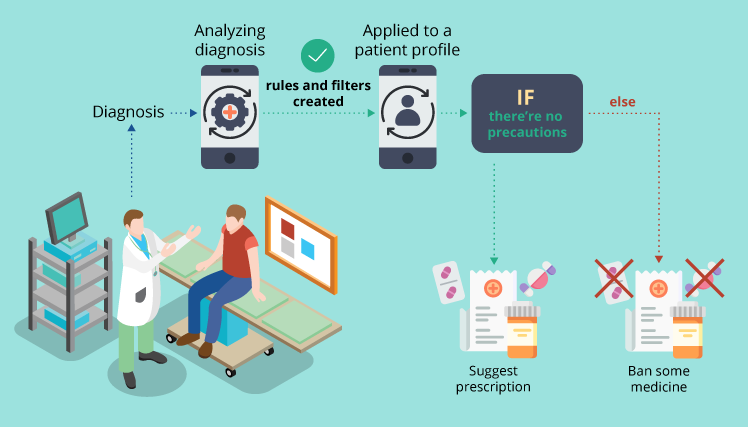Medical Apps for Doctors: Functional Overview
Mobile tech has seen a significant rise in the healthcare industry. According to Statista, 43% of US citizens were using health apps in 2024. Multiple surveys report that patients highly appreciate the possibility to consult with their doctor or renew a prescription online and on the go. Yet, mobility doesn’t focus on the patients’ needs alone and offers convenience to healthcare professionals as well.
A mobile version of EHR is the next logical step of evolution and a worthy objective for those facilities that already embraced desktop EHR and those that have yet to do so. Always available from a tablet or smartphone, easy and convenient to check with and update, a mobile EHR app can be an indispensable extension or substitution of any existing healthcare data management system.
In this article, we discuss the functions of medical apps for doctors that can be used to make work at the healthcare facilities easier. But first – why think about assembling your own app, when there are plenty of ready-made apps for healthcare professionals?

Products vs. Custom solutions
The app market is saturated with all kinds of off-the-shelf mobile software targeted at healthcare consumers and people who are conscious about their lifestyle. Such ready-made products work great, since they have general functionality that suits a wide range of audiences.
Off-the-shelf apps for doctors have multiple disadvantages. They are difficult to integrate with existing desktop solutions and mostly focus on the needs or primary care physicians. Meanwhile, each healthcare professional has their own working environment that dictates the order of multiple procedures – from patient admission to dismissal. The way these processes are handled varies in hospitals, clinics, medical centers and other facilities. Creating custom hospital apps tailored to a certain working space is objectively a shrewder choice.
Features
For a hospital app to be successful, it’s important to maintain a fair balance between meaningfulness and convenience of use. The best way to achieve this is to carefully plan out the functionality pack and make sure it only contains the most necessary features.
In our hospital app demo, we’ve gathered the features a physician would need on a daily basis and implemented them in a user-friendly interface. Below, we talk about some of these and other features and how exactly they can assist in healthcare professionals’ work.
Smart schedule
Digital form makes a schedule more flexible yet still effective and easy to follow. Changes can be made internally – right in the app by a physician, or externally – in the hospital system by appointment desk assistants. In case of external changes, the app receives a schedule update request from the server after automatic synchronization and notifies a doctor about it.
A schedule can be more than just an interactive table; it is also capable of playing the role of a full-fledged concierge that cares about its users. For instance, when a healthcare professional books two back-to-back appointments and marks their locations as two places spaced far apart, the app will suggest creating a 10-minute window for moving around. This way, a doctor will avoid the hustle and delays.
Patient tracking
A hospital app can help doctors have a keen sense of the pulse of their patients, almost literally. The app shows a list of all the patients assigned to a logged-in healthcare professional and allows viewing the latest vital indications, lab results or examination summary of any of them. In case of some alarming changes, the app sends out an emergency push notification to draw a doctor’s immediate attention. These features are demonstrated in our sample telehealth app with remote patient monitoring.
If combined with the augmented reality technology, the app can also scan the barcodes on the patients’ hospital wristbands and promptly display their profiles. This will spare a healthcare professional the time spent on finding and opening necessary documents on their tablet.
![]()
Assisting algorithms
A medical app for doctors can include smart analytic algorithms that will assist in the daily routine. Diagnostic memory, for instance, gathers data that a healthcare professional enters in the app once and allows reusing it afterward. After a doctor assigns a diagnosis to a patient, the app runs it through the memory and, in case of recognition, suggests using a prescription that was created for this very diagnosis before.
Other algorithms can analyze the input data and run it through ‘filters’. This way, specific medications can be banned from being entered in certain patients’ prescriptions. Even if a doctor accidentally inputs a medication that a patient with a long list of allergies is allergic to, the app will find a match in the ‘Allergies’ section of the patient’s profile and immediately notify the doctor about the inconsistency. Similar blacklists can also be created to contain medications that didn’t work well for the patient or are incompatible with the medications the patient is already taking by another doctor’s prescription.

Knowledge base
No matter how experienced a healthcare professional is, they can always benefit from consulting or double-checking. A medical app for doctors can be a portable outlet to the internal knowledge base, created with the help of a facility’s healthcare specialists and stored on a separate, secured server. The app’s conveniently designed information architecture will enable easy navigation and quick search via multiple filters.
The app can be especially useful as a quality assurance tool for the interns, who are less confident in their skills and have less real-life practice. By consulting with the app, they will both get the correct information and avoid discrediting themselves because of constant consulting with their coworkers.
Endnote
Medical apps for doctors let hospital healthcare professionals provide high-quality care to their patients. When containing the most useful features and providing a great user experience, a hospital app becomes a simple yet powerful tool to support the daily work of both experienced and aspiring doctors.

